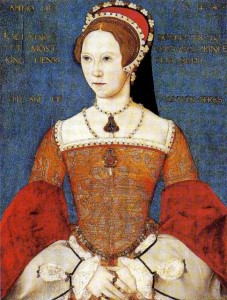 On 8th June 1536, Henry VIII’s eldest daughter, Mary, continued in her quest to reconcile with her father following the death of Anne Boleyn. Letters and Papers has a record of her letter:
On 8th June 1536, Henry VIII’s eldest daughter, Mary, continued in her quest to reconcile with her father following the death of Anne Boleyn. Letters and Papers has a record of her letter:
“Begs his daily blessing. Though she understands, to her inestimable comfort, that he has forgiven all her offences and withdrawn his displeasure long time conceived against her, her joy will not be full till she is allowed to come to his presence. Begs pardon for her continual suit and rude writing, for nature will suffer her to do no otherwise. Hopes God will preserve him and the Queen, and send them a prince. Hownsdon, 8 June.”1
Unfortunately, things were actually going to get worse between father and daughter because Henry still expected his daughter to submit and accept him as the Supreme Head of the English Church and to accept her illegitimacy. On 15th June 1536 Henry sent members of his council to bully Mary into submission. See Henry VIII’s Council Bullies Mary.
While Mary was writing this letter, Parliament me and passed the Second Act of Succession (28 Henr. VIII, c. 7). Parliament confirmed that the King was “lawfully divorced” from Anne Boleyn and declared her “attainted by authority of Parliament, as she already was by common law. Parliament then confirmed the legitimacy of Henry VIII’s marriage to Jane Seymour:
“and [forasmuch as you] have chosen and taken a right noble, virtuous, and excellent lady, Queen Jane, to your true and lawful wife; who, for her convenient years, excellent beauty, and pureness of flesh and blood, is apt to conceive issue by your Highness; which marriage is so pure and sincere, without spot, doubt or impediment…”2
and the illegitimacy of Mary and Elizabeth:
“May it now please your Majesty, for the extinguishment of all doubts, and for the pure and perfect unity of us your subjects, and all our posterities, that inasmuch as the marriage with the Lady Catherine having been invalid, the issue of that marriage is therefore illegitimate; and the marriage with the Lady Anne Boleyn having been upon true and just causes deemed of no value nor effect, the issue of this marriage is also illegitimate; the succession to the throne be now therefore determined to the issue of the marriage with Queen Jane.”3
Notes and Sources
- LP x. 1083
- Froude, James. The Essential James A. Froude Collection, p1305
- Ibid.